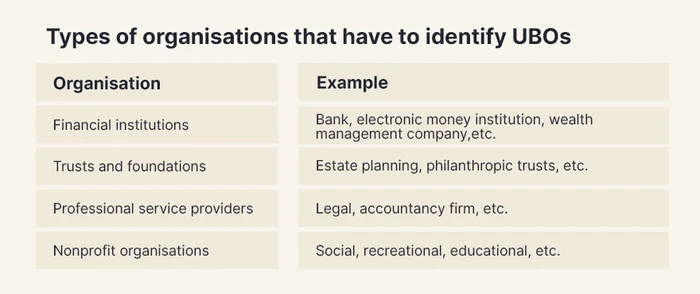Who is an Ultimate Beneficial Owner (UBO)?
In an era where global financial systems are interconnected and the complexities of corporate structures abound, understanding the true ownership and control structure of companies has become an essential aspect of ensuring transparency, accountability, and combating illicit financial activities. At the heart of this endeavour lies the concept of Ultimate Beneficial Ownership (UBO), a critical term in the realm of corporate governance and financial regulation.
The definition of the Ultimate Beneficial Owner (UBO)

The Ultimate Beneficial Owner refers to the individual or individuals who has ultimate effective control over a company or organisation. They are the real beneficiaries behind the legal entity, regardless of complex ownership structures or nominee holdings. Identifying the UBO is crucial for anti-money laundering, counter-terrorism financing, and regulatory transparency efforts. It helps authorities trace funds, prevent financial crimes, and ensure that corporate structures are not misused for illicit purposes. By knowing the UBO, regulators can enforce appropriate measures and safeguards to maintain integrity in the financial system.
What is UBO legislation?
UBO legislation refers to the legal framework and regulations that require companies and organisations to disclose and maintain information about their Ultimate Beneficial Owners (UBOs). This legal framework aims to enhance transparency in business ownership structures, combat illicit financial activities like money laundering and terrorist financing, and promote higher standards of corporate governance.
These regulations typically require companies to identify and report the individuals who have significant control or ownership over the entity. These laws vary between countries, but common features include:
- UBO Identification: Companies must identify the natural person(s) who owns or controls a certain percentage of shares or voting rights or those who exercise significant control over the organisation.
- UBO Disclosure: Companies are required to disclose UBO information to government and law enforcement authorities, and, in some cases, make it publicly accessible through registries or databases.
- Beneficial Ownership Registers: Some jurisdictions establish central registers or databases where UBO information is collected and maintained for public or authorised access.
- Compliance and Penalties: Non-compliance with UBO legislation may lead to fines, penalties, or even criminal prosecution.
UBO legislation is an essential tool in the fight against financial crimes and helps ensure that companies and their owners are held accountable for their actions. As money laundering and other illicit activities often involve hidden ownership structures and shell companies, UBO legislation aims to shed light on the true owners of businesses and prevent their misuse for illegal purposes.
Potential company risks associated with UBOs
The risks associated with Ultimate Beneficial Owners (UBOs) for companies include:
- Money Laundering and Financial Crimes: Concealed UBOs can use the company to launder money, engage in illicit financial activities, or fund criminal enterprises, exposing the company to legal and reputational risks.
- Money Laundering and Financial Crimes: Concealed UBOs can use the company to launder money, engage in illicit financial activities, or fund criminal enterprises, exposing the company to legal and reputational risks.
- Reputational Damage: If the ultimate beneficiary has controversial background, involvement in illegal activities, or unethical practices, it can undermine the company's reputation, leading to a loss of trust from customers, investors, and partners.
- Regulatory Non-Compliance: Failure to accurately identify and disclose UBO information can lead to fines and penalties.
- Risk of Sanctions: If the UBOs are subject to international sanctions or restrictions, the company could unknowingly engage in prohibited transactions, leading to severe consequences.
- Conflict of Interest: If UBOs have conflicting interests with the company, they may prioritise personal gains over the company's best interests, leading to mismanagement and decision-making biases.
- Business Partner Risk: Hidden UBOs in potential business partners or suppliers could lead to associating with entities involved in illicit activities, harming the company's business relationships.
- Hostile Takeovers: Concealed UBOs may facilitate hostile takeovers or shareholder activism, destabilising the company's operations and management.
To address these risks, companies must conduct thorough due diligence to identify and disclose accurate UBO information, implement robust compliance measures, and foster a culture of transparency and ethical business practices.
Beneficial Ownership and EU Anti-Money Laundering Directives
Beneficial ownership transparency has become a significant focus within the European Union (EU) to combat money laundering, tax evasion, and terrorist financing. To address these concerns, the EU adopted the Fifth Anti-Money Laundering Directive (5AMLD) in 2018, which required member states to establish central registers containing information on beneficial owners of corporate entities. Under the 5AMLD, companies operating in the EU are obligated to disclose details of their Ultimate Beneficial Owners (UBOs), including their names, dates of birth, nationalities, and the extent of their ownership. This move aims to increase transparency and improve the ability of authorities and financial institutions to identify and scrutiniыe the individuals who ultimately control or benefit from corporate entities, thereby enhancing the EU's efforts to combat financial crimes and ensure the integrity of its financial system.
How can a company identify the Ultimate Beneficial Owner?
A company can identify the Ultimate Beneficial Owner (UBO) through a thorough due diligence process and by collecting relevant information from its shareholders and stakeholders. Here are the steps a company can take to identify the UBO:
Collect and analyse shareholder information
Gather information on all shareholders and owners with significant ownership stakes in the company. This may include individuals, other companies, or entities. Examine the ownership structure to identify any intermediate holding companies or nominees. Look beyond the direct shareholders to determine the ultimate controlling entity.
Check ownership thresholds:
Determine the ownership thresholds defined by the jurisdiction's regulations to identify individuals or entities that meet the criteria for UBO status. Identify individuals or entities holding substantial ownership percentages, typically above the specified threshold, to ascertain whether they qualify as UBOs.
Look into voting rights and control
Assess the voting rights and significant control held by each shareholder to identify those exercising substantial influence over the company's decisions.
Request & verify information directly
Request UBO information from shareholders or beneficial owners directly. This may involve sending questionnaires or conducting interviews to collect the necessary data. Verify the UBO information provided by shareholders with relevant legal documents, such as share certificates, ownership certificates, or corporate registries.
Check beneficial ownership registers and external databases and screening
Some jurisdictions maintain central registers or databases where beneficial ownership information is publicly available or accessible by competent authorities. Utilise external databases and screening tools to check for politically exposed persons (PEPs) or individuals on sanctioned lists to ensure anti-money-laundering (AML) compliance.
Which organisations have the obligation to identify the UBO?
The obligation to identify the Ultimate Beneficial Owner (UBO) typically falls on organisations involved in financial transactions. These organisations include:

Financial Institutions
Banks, credit unions, electronic money institutions, money transfer businesses, investment firms and other financial service providers are required to identify UBOs as part of their anti-money laundering (AML) and know-your-customer (KYC) procedures.
Trusts and Foundations
Entities operating trusts and foundations are obligated to identify the UBOs to ensure transparency and prevent financial crimes.
Professional Service Providers
Law firms, accounting firms, and other professional service providers may need to identify UBOs for their clients to comply with regulations and provide legal and financial services effectively.
Nonprofit Organisations
Nonprofits and charitable organisations are also required to identify UBOs as part of their compliance with legal and regulatory requirements.
The specific requirements for identifying UBOs may vary by country and depend on the legal and regulatory framework governing each type of organisation.
Challenges in determining the Beneficial Owner
Determining the ultimate owner of a company or other legal entity can be challenging due to various reasons:
- Complex Ownership Structures: Companies often have complex ownership structures involving multiple layers, subsidiaries, and nominee shareholders, making it difficult to identify the individual(s) that ultimately owns the business.
- Cross-Jurisdictional Ownership: Identifying the Beneficial Owner (BO) of a company operating across different jurisdictions can be challenging due to varying regulations, as well as a lack of standardised reporting requirements for BO identification, not to mention language barriers.
- Privacy and Confidentiality Concerns: Some individuals or entities may seek to protect their privacy and avoid public disclosure, hindering efforts to determine the BO.
- Uncooperative or Non-Responsive Parties: Obtaining accurate information on BOs can be challenging if shareholders or entities are uncooperative or unwilling to disclose relevant details.
- Fraudulent Practices: In some cases, individuals may intentionally provide false or misleading information about the BO to evade scrutiny or engage in illegal activities.
- Data Availability and Quality: Access to reliable and up-to-date data from various sources can be limited, impacting the accuracy of BO determination.
- Technological Limitations: Manual processes for BO identification may be time-consuming and error-prone, necessitating more advanced technologies and data analytics.
Addressing these challenges requires collaboration among stakeholders, improved information-sharing mechanisms, the use of technology-driven solutions, and stronger regulatory frameworks to ensure greater transparency and accuracy in identifying the Beneficial Owner.
Conclusion
To sum up, the identification of who's really behind a business is a necessary but complex and costly procedure, especially if you're dealing with people from other countries. This is why some banks are reluctant to onboard any business with foreign ties, instead focusing on making money within local markets.
Yet, in a 21st-century world that has opened up vast cross-border business opportunities, it's unfortunate that even entirely legitimate companies encounter blocks during this process. This is where MultiPass comes in – we have both time and resources to thoroughly check and onboard international businesses, equipping them with a business account for hassle-free payments across multiple jurisdictions (in 70+ currencies)!
Want to know if you are eligible for a business account? Try our quick pre-check tool or simply get in touch for a friendly chat and take that first step toward expanding globally.
Streamlined local and international transfers for UK and non-UK residents.